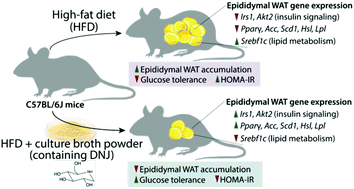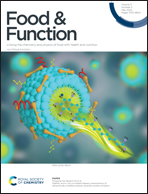Supplementation of Bacillus amyloliquefaciens AS385 culture broth powder containing 1-deoxynojirimycin in a high-fat diet altered the gene expressions related to lipid metabolism and insulin signaling in mice epididymal white adipose tissue
Abstract
1-Deoxynojirimycin (DNJ) has been known for its functional properties, such as its anti-hyperglycemic and anti-obesity activities. Previously, we developed a sustainable procedure to produce culture broth powder (CBP) containing DNJ using Bacillus amyloliquefaciens AS385 and demonstrated its regulatory effect on the blood glucose and lipid parameters in C57BL/6J mice. The present study was aimed to determine the molecular mechanism underlying the physiological effects of CBP intake in different concentrations (low, medium and high) towards the development of high-fat diet (HFD)-induced metabolic disorders. Ten-week consumption of CBP-supplemented diets ameliorated HFD-induced adiposity, glucose intolerance, and reduced insulin sensitivity in C57BL/6J mice. To investigate how these physiological events could take place, we analyzed the expression of genes involved in lipid metabolism and insulin signaling in epididymal white adipose tissue and found that CBP had a regulatory effect on the expression of genes related to lipid metabolism (Pparγ, Srebf1c, Acc, Scd, Hsl, Lpl), adiponectin secretion (Foxo1 and Sirt1), and insulin signaling (Irs1 and Akt2). Next, we confirmed that DNJ acted as the main active component in CBP and detected the dose-dependent DNJ uptake in vital metabolic tissues, which may explain the dose-dependent alteration in the metabolic parameters and related gene expressions following the CBP intake in this study. Collectively, our results suggested that DNJ intake in the form of CBP prevented the progression of HFD-induced metabolic disorders through regulation of adipocyte gene expression involved in lipid metabolism and insulin signaling.

- This article is part of the themed collection: Food & Function Recent HOT articles


 Please wait while we load your content...
Please wait while we load your content...